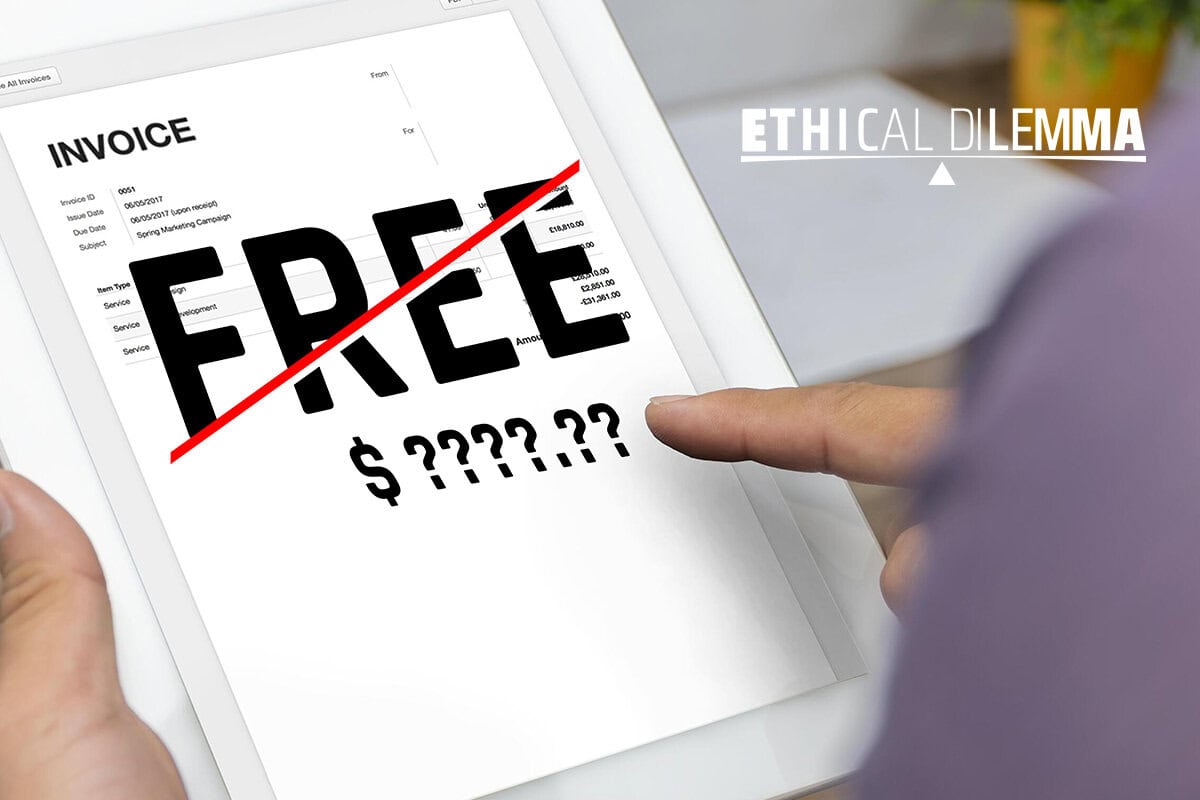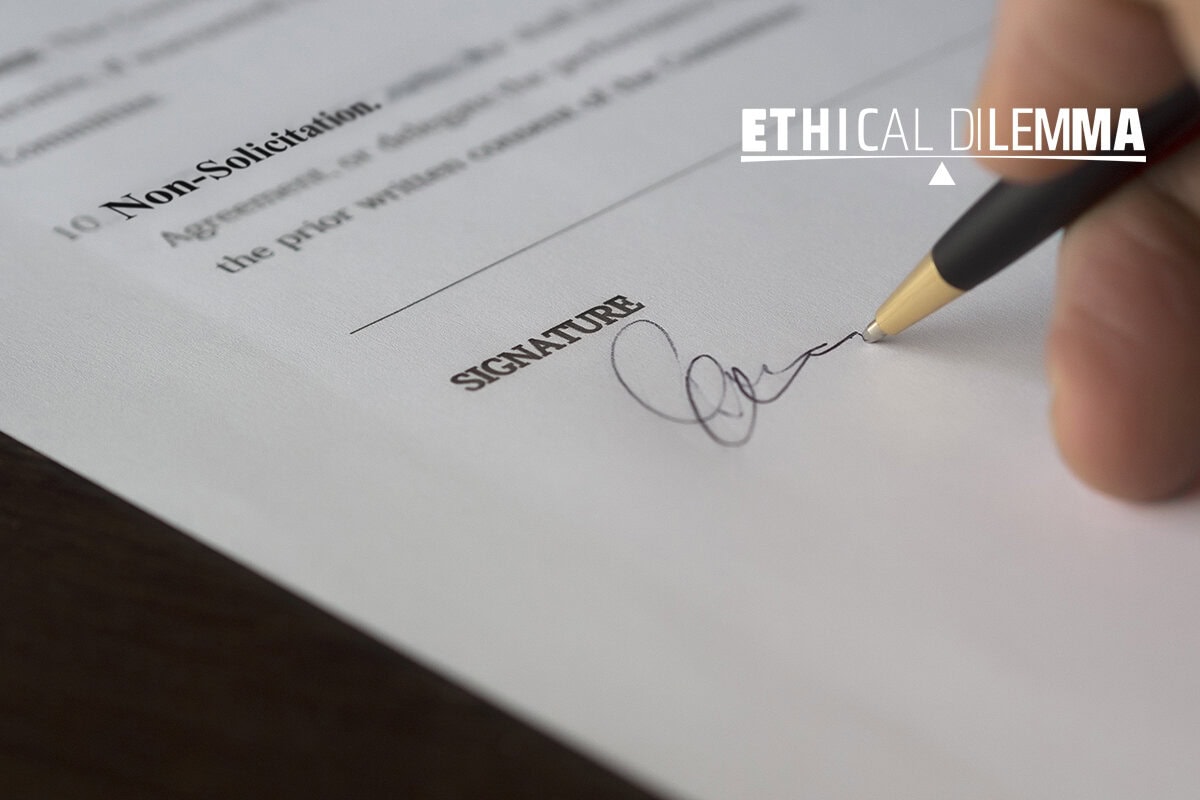This is the July 2021 edition of our monthly series of Ethics case studies titled What Do You Think? This series is comprised of case studies from NSPE archives, involving both real and hypothetical matters submitted by engineers, public officials and members of the public.
Your peers and the NSPE Board of Ethical Review have reviewed the facts of the case as shown below. And, here are the results.
Your opinion has been registered for the July 2021 edition of our monthly series of Ethics case studies titled What Do You Think?
Your vote is recorded as:

Want to know how your peers voted? We’ll send you an email with the poll results on July 27.
Your opinion has been registered for the July 2021 edition of our monthly series of Ethics case studies titled What Do You Think?
Your vote is recorded as:

Want to know how your peers voted? We’ll send you an email with the poll results on July 27.
A Review of the Facts
Engineer Tom is a principal in Superior Engineering, a firm that performs utility audits for large corporations. Tom’s firm reviews the corporations’ activities, budget, business forecast, needs and requirements, and other factors, and makes recommendations concerning the most appropriate use of equipment and utilities in the performance of its services. Generally, Tom recommends an approach that includes a request for proposals and a list of potential service providers who prepare a proposal and bid to perform services for the firm.
In recent years, utility service providers have established a custom of providing a “rebate” to utility audit firms that perform the audits for the corporations, which is calculated to reflect the savings the audit firm has provided for its clients. As a business practice, when Tom receives a copy of a rebate check from one of the service providers, he makes a copy of the check and sends the copy with half the amount of the check to the client with a note “Another benefit provided to you by Superior Engineering.” The general practice among many other utility audit firms is to keep the check and provide nothing to the client.
1. Is it ethical for Tom to accept the rebate check?
2. Is it ethical for Tom to send a portion of the rebate check to the client in the manner indicated?
Applicable NSPE Code References:
Code II.4.c: Engineers shall not solicit or accept financial or other valuable consideration, directly or indirectly, from outside agents in connection with the work for which they are responsible.Code III.3c: Engineers shall avoid all conduct or practice that deceives the public.
Code III.5.bc: Engineers shall not accept commissions or allowances, directly or indirectly, from contractors or other parties dealing with clients or employers of the engineer in connection with work for which the engineer is responsible.
Code III.6.ac: Engineers shall not request, propose, or accept a commission on a contingent basis under circumstances in which their judgment may be compromised.
Discussion
The facts in this case bring together a reality of certain trade practices which are in a collision course with the ethical constraints of many practicing professionals. The issue of rebates, bonuses, kickbacks, gifts, and other “emoluments” directly raises the specter of conflict of interest with few mitigating circumstances. While the general aspect of conflict arises in the practice of engineering in many forms, the direct circumstances of this case afford the opportunity for analysis from several points of view.
Taken at face value, Superior Engineering, either exclusively, or as part of a larger set of services, is in the business of finding economic savings for its clients.
Beyond the protection of public health safety and welfare, engineering as a profession has an inherent objective of optimization, in this case, economic usage or cost/benefits. Directly, then, the elements of the Preamble relating to professional behavior and ethical conduct impact the work of this firm in all of its endeavors in this particular type of work.
Business practices have changed significantly over the years making for a more competitive environment less tightly bound to old and customary practices. While these changes evolved, also did new customs. This forms the crux of the advent of “rebates,” “bonuses,” and other forms for rewards of finding cheaper ways of doing business…with savings sufficiently large to attract the development of utility audit firms, something euphemistically called earlier “efficient experts.”
Code II.4.c. is unequivocal in the edict that “Engineers shall not solicit or accept financial or other valuable consideration, directly or indirectly, from outside agents in connection with the work for which they are responsible.” While the original intent of this was directed to “kickbacks”, the introduction of an element relating to “third party custom legitimacy” does not create any mitigating measure to the specifics of the Code.
Code III.5.b, is again, forthright in stating “Engineers shall not accept commissions or allowances, directly or indirectly, from contractors or other parties dealing with clients or employers of the engineer in connection with work for which the engineer is responsible.” This tenet adds further dimension to the issue in that any form of added remuneration above and beyond the contractual fees involved are directly impacted by these provisions.
Since, either by implied formula or another algorithm the monetary payment to Superior Engineering is determined, it has all the elements of “contingency.” To this end, Code III.6.a. edicts “Engineers shall not request, propose, or accept a commission on a contingent basis under circumstances in which their judgment may be compromised.” This clear “conflict-of-interest aspect” again devolved on mitigation from the “customary trade aspects” issue. Further, any willingness to engage in this practice in any form would appear to invoke the provisions of the tenet to imply that such remuneration would be, de facto, a part of any contract with the client in the first instance.
In Code III.3, the general premise that “Engineers shall avoid all conduct or practice that deceives the public ” clearly and concisely wraps the three provisions, along with the Preamble into an unmistakable “field of mines” in which any engineering firm would give more than “pause” to enter.
On the opposite side of the coin and using the utility field as a case in point, recent events pointing to “demand-side management” has provoked an opportunity for saving on both the side of the utility as well as for their clients. In a given instance, an “audit company” by the recommendation of new operational procedures, could effect substantial advantages to the serving utility as well as the client. Going a step further, a more intense audit and recommendations might reveal an even more highly effective measure by moving to another server (e.g., a co-generation producer) or to in house co-generation. Into this potentially tangled web involving a variety of professional engineering aspects, does it seem fair to exclude some form of added remuneration to the engineering firm, and the savings fall to those who are recipients of the largess, even though in a passive manner? Obviously, this has a philosophical as well as an ethical connotation which may be often at cross purposes, when ethical imperatives of fairness and equity may be involved as well.
In this instance, whether or not Superior Engineering retains part of the “rebate” or not, or that by sending one half to the client “under any set of explanations” affords no mitigating element to the question of ethical conformity or not.
The fundamental question of being a party to such a “trade custom” whether formal or informal, moves the issue back into the area of the basic agreements with clients for these services. While “disclosure” relating to any conflict of interest aspect has not been surfaced, any implicit or implied inclusion of the “rebate” process should have widespread implications, obviously of concern to the public and of perhaps significant legal improprieties.
The Ethical Review Board’s Conclusion

1. It was unethical for Tom to accept any “rebate” check despite the conditions created by the customary trade practice.
2. The act of forwarding one-half of the rebate to the client reflects an additional step that “digs a deeper hole,” as it directly involves a contingency circumstance for which the client is already paying, and thus, could be interpreted as a “kickback” related to the contingency aspects of the quality of Superior Engineering’s work. Under such circumstances, the client could very well question if Superior Engineering’s work was in any way compromised and thus reflected in the amount of the part remitted to the client. The actions in each of these instances were unethical.
BOARD OF ETHICAL REVIEW
William A. Cox, Jr., P.E., James G. Fuller, P.E., Donald L. Hiatte, P.E., Robert L. Nichols, P.E., William E. Norris, P.E., Jimmy H. Smith, Ph.D., P.E., William W. Middleton, P.E., Chairman
Note – In regard to the question of application of the Code to corporations vis-a-vis real persons, business form or type should not negate nor influence conformance of individuals to the Code. The Code deals with professional services, which services must be performed by real persons. Real persons in turn establish and implement policies within business structures. The Code is clearly written to apply to the Engineer and it is incumbent on a member of NSPE to endeavor to live up to its provisions. This applies to all pertinent sections of the Code. This opinion is based on data submitted to the Board of Ethical Review and does not necessarily represent all of the pertinent facts when applied to a specific case. This opinion is for educational purposes only and should not be construed as expressing any opinion on the ethics of specific individuals. This opinion may be reprinted without further permission, provided that this statement is included before or after the text of the case.









The client was well aware and no complaints were documented. Leave well enough alone as long as nobody is victimized, rather mutual benefit is gained in a completely transparent manner. Good judgement and good will are a nice part of commerce and should be encouraged. Make an informed exception.
It would seem that this customary practice of providing rebates fails the “sniff test”, i.e. if it smells like a kickback it probably is. An “audit” should be a test or review of something that is is unencumbered or influenced by any entity or person. In this case it may be a practice, but this practice at least has the perception of outside influence.
Seems like this is similar to lawyers taking contingency fees for legal representation. In any case it would seem that any savings or sharing of possible incentives would be covered by the contract terms.
Regardless of whether the process is labeled a “custom”, rebate, etc…, why isn’t the payment considered part of Superior Engineering’s compensation? Profit sharing mechanisms are not illegal, and savings act like profits. The fact that Tom sends money back is equivalent to working for less than originally agreed, which is not a guarantee that the product or service provided was inferior. Working for less than you are worth to a company is the exact reason why a company will hire someone – the employee earns or saves the company more than they are paid. The Superior Engineering scenario is a different way of achieving the same end result, and helps encourage future business together. Also, the rebate mechanism is available to all audit providers, and all audit providers are able to refuse all, part, or none of the rebate, so there is not an unfair advantage provided to any party.
One of the very few that I selected the wrong answer. I am wondering what the difference is between this rebate and “Predominate Use Studies.” In a Predominate Use Study, the PE is requesting a “rebate” from the state sales tax where the PE’s engineering firm usually contracts for a portion of the tax rebate. If this is simply a matter of semantics, would your scenario be accepted if “rebate” were replaced with “tax refund?” ,
The question is resolved in the contract between the engineering firm and the client. How is the engineering firm paid? The present case is silent. If the contract was based on shared savings this is probably ethical. If the contract was at full price for the engineering hours and silent on the fact that there would be a rebate from the provider it is not ethical. Transparency!
Tom’s work product includes a “list of potential service providers.” If the successful bidder to provide services to Tom’s client sends him a check, it could clearly be construed and a kickback for being on the “list”, and an inducement to be named to the list in the future. This is not a good optic for any engineering firm, regardless of industry practice among audit firms that may or may not be professional engineering firms.
I to missed the answer on this one. However, I a number of areas, there is only one utility provider for each service. In this case, I’m still not sure this would be unethical as I would see it as a savings that is passed up the line. If company A is a big natural gas user and can only get natural gas from Gas Provider, Inc., the study would in essence be conducted to find ways of lowering natural gas usage. If say a more efficient burner is found and will provide a 10% lowering in gas usage, isn’t Gas Provider, Inc. also benefiting directly from said study? Should they not pay for their “usage” of the study?
In my opinion;
If the custom is for everyone to accept these checks, then his refusal to accept the check could cause more problems. Putting this custom into the contract would solve the ethical dilemma.
On the other hand the “kickback” check back to the client is not a custom, and is an ethical issue.
In summary the first one falls in a gray area the second one does not.
For me why is the engineering firm afforded the rebate from the utility instead of the client. The client has the relationship with the utility. This is where things are going awry. Similar to installing an energy efficient appliance in your own home, the rebates offered for upgrading are for the homeowner not the installer. Similarly any Federal Tax Credits. So the rebate to the consultant/installer feels like a kickback from the utility rather than a rebate to the utility customer. While the engineering firms contract with the customer could state the rebate sharing practice, as a customer I’d be wondering why the engineering firm is getting the rebate and not ourselves as the utility customer. Thus in the vein of “ill gotten gains” the review board is going with unethical.
If this a common practice, it is prudent to address it in the contract with the client. To avoid appearance of conflict of interest, the engineer should point out the practice and stipulate that he will not accept a rebate from any supplier. He should also make that clear to suppliers who are asked to offer a bid. He could suggest that any rebate be offered to the end user and let the two parties decide. The rebate could still encourage energy savings, usually a positive outcome.
I also voted opposite the decision. One thing that wasn’t clear was who executes the the acceptance of the bids. If Tom’s firm selects and executes the contracts, then clearly unethical. If the client is responsible for bid review and contracting with the service providers without Superior Engineering’s involvement then we’re in a bit of grey area as Superior has no involvement in the selection. This type of ionformation should be included in the dilemma statement to make things a bit clearer. Still not sure why the providers write a check to the consultant vs. the end client. In doing so, it does look more like a “reward” for being on the list of bidders. We also don’t have the contract information between Superior and the client, where, it may be spelled out that any rebates received by the firm will be divided equally between the firm and client. That would then make the acceptance and splitting of the rebate ethical as it is identified in advance of the ocurrance.
Many of the energy efficiency contracts will designate a % of the savings garnered will be part of the consultant’s fee. Thus the larger the savings to the client, the larger the reward to the consultant. If it’s spelled out in the T’s & C’s it’s not unethical if agreed to by both parties.
Once again, the lack of all the facts makes the ethical / unethical decision difficult.
From the utilities point of view, do you think they feel entitled to the entire “kickback” themselves for these cost saving measures, that someone else came up with? Could an engineer on the utility’s payroll receive a Christmas bonus check for the amount that the auditing engineer saved the utility? Could an engineer not have written into his contract to receive a percentage of whatever cost saving recommendations he has made, so that it is not a kickback but part of the services agreement?
thank you for a Voice of reason
I read the brief as it was at the company level, not at the engineer level. The company received the benefit of the rebate and the utility received half of the amount of the rebate. I didn’t read that the individuals personally benefitted from the transaction. I don’t see a problem if all of the accounting is transparent and if none of the individuals personally benefit from the rebate. Even if one company or the other decides to use the funds to pay for an employee event – everyone at the company benefit, not the one engineer that performed the work.
I can see a potential issue if there is a one man engineering firm and he personally benefits from the rebate.
It’s done all the time but is it ethical? I’ve been told it’s the industry standard. Should an engineering firm present a person who is not in their employ for a project?